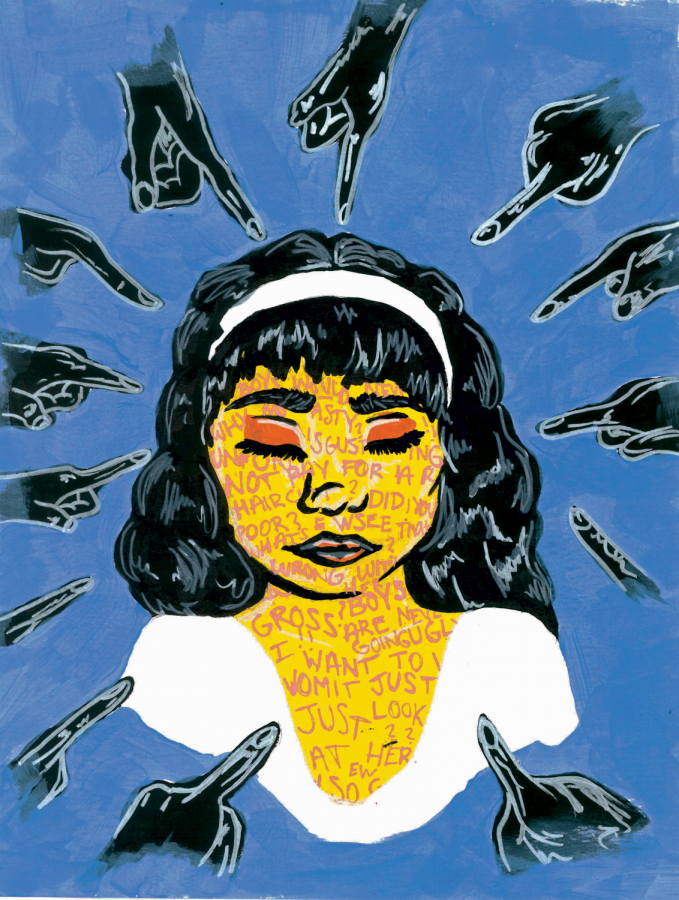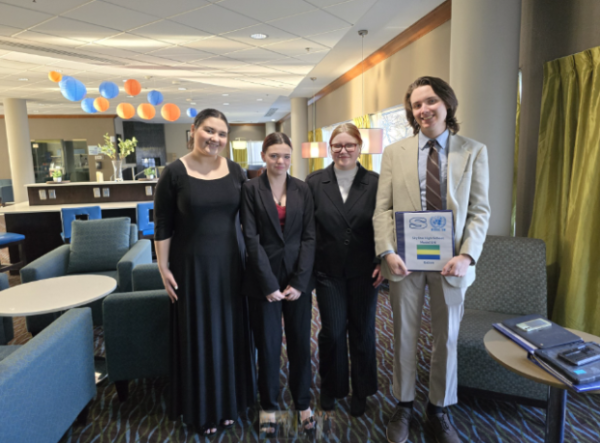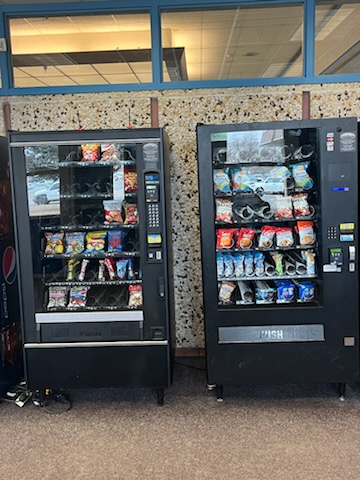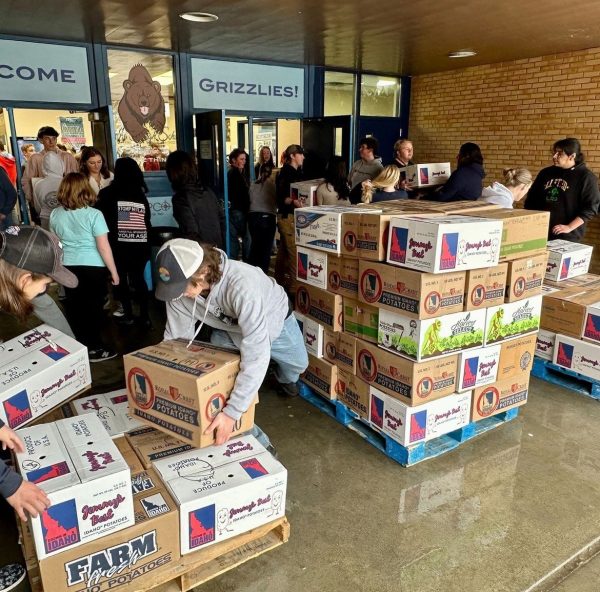Skyline in Denial
Denying it is a dangerous road to devastation in our district.
Photo Credit: Daniel Antonson
Bullying is a persistent and invasive issue at SHS that many deny to exist in our school walls.
The Skyline High School 2019-2020 handbook defines bullying as “a student or groups of students repeatedly use their personal power with the clear intention to hurt another student or group of students. Bullying may include, but not limited to physical (hitting, pushing, punching, cornering), verbal (calling names or insults, threatening, telling cruel jokes), and indirectly (isolating, rejecting, excluding, ranking or rating, giving hateful looks),” also clarifying, “Bullying is not playful teasing between relatively equal individuals.”
It’s not currently a federal crime to bully someone; however, it is a state-authorized offense. According to section 18-917A of Title 18, involving crime and punishments, in Idaho Legislation, no student is allowed to intentionally bully another student at school or school activities. However, this is specifically outlined to mainly include harassment including specific gestures, verbal assault, damage of property, fear of harm, or physical harm to another student. The statute also states that bullying must be “sufficiently severe, persistent or pervasive that it creates an intimidating, threatening or abusive educational environment for a student.”
The Federal website for bullying also reports that 1 in 5 students are bullied nationwide.
However, when our Vice Principal Jody Immel was asked how the school’s administration approaches bullying, she explained, “First of all, it has to be a real ‘bully’ incident. One of the things that we’ve discovered over time is that bullying has to be persistent and invasive. It doesn’t have to be constant, just more than once. It really has to interfere with life function, like learning is a life function. Walking around calling someone a name isn’t being a bully. Not sitting by somebody at lunch isn’t being a bully. And then my thing is, I go straight to the SRO [School Resource Officer] and the bully will get a ticket. If we can prove it’s bullying, then they get a ticket.” We also asked Immel if she believed that Skyline had a bullying problem, where she promptly stated, “No, because it’s not the true sense of bullying.”
Immel appears to be contradicting the Student Handbook by stating that mistreatment is not in the definition of bullying. This contradiction allows the district to get away with ignoring the legitimate problem of behavioral issues at SHS by establishing an “out of sight, out of mind” attitude. This problem creates a hostile learning environment where fights, bullying, and other legitimate concerns with student relationships are on the rise.
Compass Academy, also in District 91, has a strict no bullying policy and their bullying rates seem to be lower than SHS. WSS interviewed their principal, Shelly Smede, with nearly the same questions as Immel was asked, looking for a comparison between the schools.
When we asked Smede how Compass approached bullying she explained, “Bullying is not tolerated. School district policy is clear on that. If we have verified bullying, we usually send an invitation to parent and perpetrator that includes the serious consequences of bullying and a face-to-face meeting with parent, student, and principal. We often ask the perpetrator to sign an agreement that if there are any additional reports of mistreatment that we turn the issue over to law enforcement and press charges. We tell our students that it is impossible for a person who is afraid to learn at school and we will not tolerate harassment or bullying in any form. If there has been injury – physical or emotional – we might also suspend the perpetrator. If the target is willing, it sometimes helps to have a mediation between the two students but we NEVER force that because we don’t re-victimize targets.” She then explained that a report is addressed within 24 business hours. When we asked her if Compass feels like they have a bullying problem she stated, “Every year, students complain that they are being mistreated. I believe all high schools have that problem. We make it incredibly clear that this behavior does not fit into the culture at Compass. Over time, students realize that there is no reason to mistreat other people – in fact, it makes the perpetrator look juvenile and does not fit into civil society.”
Smede then explained that Compass has an anonymous Google Form that is sent out to every student in the weekly newsletter at the top of the list of issues. When we went looking for the form, we quickly discovered it was one of the two things listed under “Students” on Compass’s website. What Smede said was correct, the form provides a place for the student to choose the area the issue entails, including substance abuse, mistreatment, bullying, etc., provide some more detail, and leave their name if they want to.
There appears to be a distinct disparity between how SHS and Compass administrators handle bullying that make a legitimate difference. This disparity goes as far as simply the rhetoric our school leaders use, and the action they take.
For example, when we asked Smede how they plan to approach bullying in the future she told us, “We will continue to improve in this area. I refuse to allow the word “snitch” to be used in my presence. Students who ask for help for themselves or classmates are witnesses, not snitches. I also protect the identity of witnesses,” she then continues, “We also have class meetings with each grade level every trimester to gather feedback and make improvements to the experiences students have at Compass.”
When asked this same question, Immel responded quickly: “The same [approach]”, referring to the previous actions Skyline has taken.
While Skyline attempts every single option before dishing out a punishment, then hopes for a solution, Compass Academy immediately contacts parents and goes to the root of the problem, expecting results immediately from the bully. Where Compass establishes an expectation of respect and good behavior at school, Skyline often allows students to essentially get off “scot-free” by trying to cause intervention with the student themselves, rather than asking parents to get involved or the authorities.
We conducted a poll on social media that resulted in a surprising conclusion from SHS students. The poll consisted of three questions. First, we asked “Does Skyline have a problem with bullying?” Out of 44 responses, 61 percent said yes. We then asked “Have you been bullied?”, receiving 54 responses, 64 percent of students stated yes. And finally, we asked “Do you think the administration handles bullying appropriately?” 85 percent out of the 52 responses said no. While school officials would like to say that bullying is not a problem at our school, our students say otherwise.
Despite the replies of SHS students, Immel stated when asked how common she thought bullying was at Skyline, “Bullying in the true sense, not very. People being [mean] is all the time. As far as the true term of ‘bully’, I’ve only had two tickets this year. And I usually don’t, last year I didn’t have any. It’s not common.”
Overall, it appears that part of the problem with bullying at Skyline can be attributed to the lack of awareness on the issue. While there is a difference between mistreatment and bullying, both issues should be addressed properly with the perpetrator.
Although school officials like to say that “bullying” in its “true sense” is only in the range of the legal definition in Idaho, the school handbook and other district administrators say otherwise.
No matter how one views this issue, it’s undeniable that the statistics and the outcry from students says one thing: Bullying is an issue for every high school, administrator, teacher, and student in some way, no matter what.

I would like to go into English Literature and Political Science and eventually become a professor. I am a three-year debate student who is way too busy....









Jody Immel • May 6, 2020 at 12:41 am
Miss Fairchild – So much was said here and you would like me to respond personally to you? You can do the same. I’ll start with the easy stuff. I did not threaten you in any way. I did not mock you or the paper either. I have no idea where you even came up with me wanting to contact your parents over this. I pointed out that your statistics are in error. Please feel free to contact any of the math teachers, statisticians, even Google to get an idea of sample size versus population. I’m not going to address any of the other comments in your reply. And, I really did mean for you to have a nice summer.
Mikayla Antonson • Apr 27, 2020 at 2:15 pm
Fantastic article Bianca! It was very well written and shed light on a serious issue. I loved the comparison between two different high schools in the same district. It was a pleasant surprise to see my brother’s artwork featured as well!
Jody Immel • Apr 19, 2020 at 1:21 am
While I find this article typical of media shock value over the years, it is a lot of misinformation. I love how a very long conversation NOT with the author of this article turned a couple of quotes to fit the agenda. I won’t go too far into that. What I will say is that the “statistics” shared would not even be considered valid in any sense of the word in a scholarly article. I actually read this article before the quarantine, so I may be off on a couple of numbers. But, I do believe the population of the school in early March was 1267 students.
That would mean that:
3.4% of students said SHS has a problem with bullying. The other 96.6% either don’t think so or didn’t have an opinion.
4.26% have been bullied. It doesn’t specify at SHS or elsewhere, but the number is higher than those that think bullying is a problem, so who knows. A logical assumption would have people being bullied also feeling that bullying is a problem. But, again,95.74% either aren’t bullied or don’t have an opinion.
And, finally, 4.1% feel that administration doesn’t deal with bullying appropriately. That leaves 95.9% of students content or with no opinion.
There were two administrators in the room during this interview. I’m sure if the article writer had been present rather than looking for shock value, this article could have been a tad bit more accurate.
PS Admin works regularly with the authorities and parents.
Have a nice summer
Bianca Fairchild • Apr 26, 2020 at 12:29 pm
Hi Ms. Immel, I’m the author of the article. First, I’d like to be clear about your claim that my article was written in a frame of misinformation. As a overarching statement, I’m pretty sure it’s the students who spend most of our time together and in the school environment that would know if bullying at Skyline exists, not the vice principal who works from their office. Not to say that you don’t know anything about your job, but you don’t sit in our classes, nor do you live in our toxic environment. Second of all, I sent a few of my staffers that were aware of what the story was meant to be, I authored the questions you were asked, you agreed to be recorded, and I took quotes exactly from what you said. If you have a problem with that, then we can discuss that privately. Thirdly, the statistics are not a holistic, total summarization of how the entire community feels about the issue of bullying. Statistics are based on sample groups, so sure, it can have some flaws, but the numbers were still notable. Based on my sample group, a good portion of students believe our school has a bullying problem. For you to say that 4% of the school has been bullied and assuming every student who replied was every student who has been bullied at the school is a misrepresentation of how sample groups work. That applies to how we view the administration as well.
I’m aware admin works regularly with authorities and parents, that was included in the article. That wasn’t the argument we were making. And if you’re threatening that you’ll be discussing this with my parents, they fully support me.
Next time you have an issue with a story we publish, maybe discuss it with us first before you attempt to publicly mock us on our own website. And please speak to students with respect, as well as hear what we have to say, rather than assume we’re basing our beliefs on little or no facts. I believe your job is to help protect and support us, not put us down like in a Facebook comment.
I’ve also noticed that you didn’t mention the part about the federal government’s definition of bullying, which was directly contradicted and is consistently ignored by the administration, despite how it applies to our community.
Have a nice summer! Contact me personally if you have more to say.